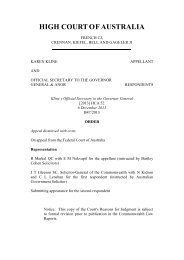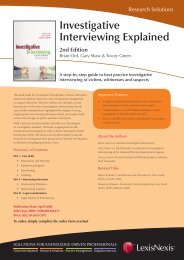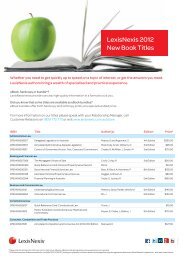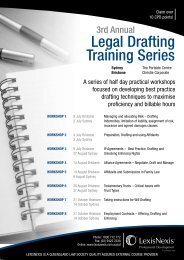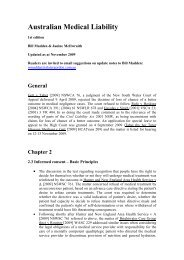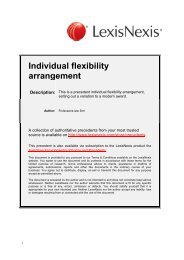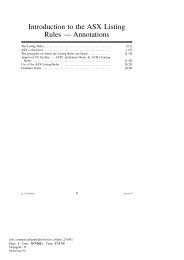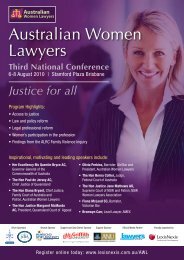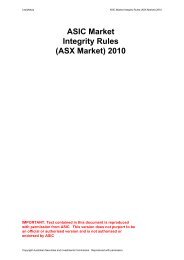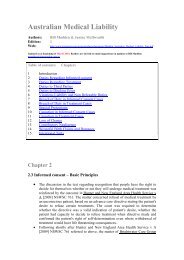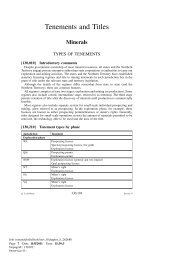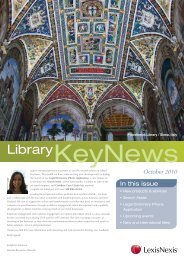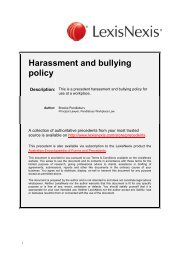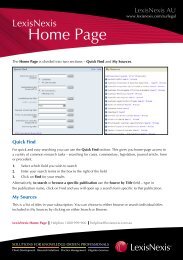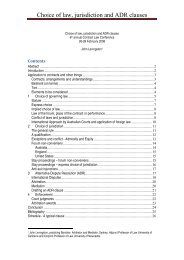Copyright LexisNexis. Sample only, not for classroom use or ...
Copyright LexisNexis. Sample only, not for classroom use or ...
Copyright LexisNexis. Sample only, not for classroom use or ...
You also want an ePaper? Increase the reach of your titles
YUMPU automatically turns print PDFs into web optimized ePapers that Google loves.
PRINCIPLES OF AUSTRALIAN EQUITY AND TRUSTS<br />
12.22 It is to be <strong>not</strong>ed that there is <strong>not</strong> a great difference between the two streams of proprietary<br />
estoppel. Rather, they simply reflect differing levels of passivity on the part of the landowner.<br />
The actions of the landowner, in either encouraging expenditure <strong>or</strong> acquiescing in expenditure,<br />
constitute fraud in equity. In Ward v Kirkland [1967] Ch 194 at 239, Ungoed-Thomas J observed as<br />
follows:<br />
It was suggested be<strong>f<strong>or</strong></strong>e me that there was a distinction between an act which is acquiescing <strong>or</strong><br />
encouraging a person in such circumstances to expend money and merely standing aside with the<br />
knowledge that such money was being expended in reliance on having the right which is claimed.<br />
I, <strong>f<strong>or</strong></strong> my part, fail to see any substance in this distinction. The fundamental principle of the equity<br />
is unconscionable behaviour, and unconscionable behaviour can arise where there is knowledge<br />
by the legal owner of the circumstances in which the claimant is incurring the expenditure as<br />
much as if he himself were requesting <strong>or</strong> inciting that expenditure. It seems to me that abstention<br />
as well as request <strong>or</strong> incitement can fall within the principle from which the recognition of the<br />
claimant’s equity arises.<br />
12.23 A comm<strong>only</strong> cited statement of the relevant elements of proprietary estoppel is that of Fry J<br />
in Willmott v Barber (1880) 15 Ch D 96 at 105–6, where his Honour said:<br />
A man is <strong>not</strong> to be deprived of his legal rights unless he has acted in such a way as would make<br />
it fraudulent <strong>f<strong>or</strong></strong> him to set up those rights. What, then, are the elements <strong>or</strong> requisites necessary<br />
to constitute fraud of that description? In the first place the plaintiff must have made a mistake<br />
as to his legal rights. Secondly, the plaintiff must have expended some money <strong>or</strong> must have done<br />
some act (<strong>not</strong> necessarily upon the defendant’s land) on the faith of his mistaken belief. Thirdly,<br />
the defendant, the possess<strong>or</strong> of the legal right, must know of the existence of his own right<br />
which is inconsistent with the right claimed by the plaintiff. If he does <strong>not</strong> know of it he is in the<br />
same position as the plaintiff, and the doctrine of acquiescence is founded upon conduct with<br />
a knowledge of your legal rights. Fourthly, the defendant, the possess<strong>or</strong> of the legal right, must<br />
know of the plaintiff’s mistaken belief of his rights. If he does <strong>not</strong>, there is <strong>not</strong>hing which calls<br />
upon him to assert his own rights. Lastly, the defendant, the possess<strong>or</strong> of the legal right, must have<br />
encouraged the plaintiff in his expenditure of money <strong>or</strong> in the other acts which he has done, either<br />
directly <strong>or</strong> by abstaining from asserting his legal right.<br />
12.24 Later cases indicated that one did <strong>not</strong> have to establish all these elements to succeed in a<br />
proprietary estoppel claim, with the ‘real test’ being, as Buckley LJ said in Shaw v Applegate [1978] 1<br />
All ER 123 at 131, ‘whether on the facts of the particular case the situation has become such that it<br />
would be dishonest, <strong>or</strong> unconscionable, <strong>f<strong>or</strong></strong> the plaintiff, <strong>or</strong> <strong>f<strong>or</strong></strong> the person having the right sought<br />
to be en<strong>f<strong>or</strong></strong>ced, to continue to seek to en<strong>f<strong>or</strong></strong>ce it’. M<strong>or</strong>e recently, in Th<strong>or</strong>ner v Maj<strong>or</strong> (2009) 3 All ER<br />
945 at 957, L<strong>or</strong>d Walker of Gestingth<strong>or</strong>pe said that ‘the doctrine [of proprietary estoppel] is based<br />
on three main elements: … a representation <strong>or</strong> assurance made to the claimant; reliance on it by the<br />
claimant; and detriment to the claimant in consequence of his (reasonable) reliance’.<br />
The consolidation of promiss<strong>or</strong>y and proprietary estoppels<br />
12.25 In Waltons St<strong>or</strong>es v Maher, the High Court handed down its most significant decision on the<br />
topic of estoppel. The significance of this case was that it consolidated promiss<strong>or</strong>y and proprietary<br />
estoppels into the single, and broader, principle of equitable estoppel.<br />
<strong>Copyright</strong> <strong>LexisNexis</strong>. <strong>Sample</strong> <strong>only</strong>, <strong>not</strong> <strong>f<strong>or</strong></strong> <strong>classroom</strong> <strong>use</strong> <strong>or</strong> distribution.<br />
272<br />
Spi-Radan & Stewart - Principles of Australian Equity and Trusts 2nd ed. Ch.12.indd 272 10/10/2012 05:22:31<br />
200595



